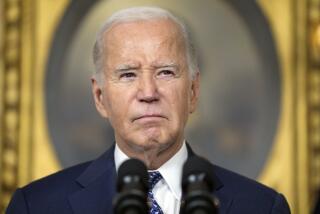He’s a Candidate, but Not Manchurian
- Share via
With the metamorphosis of Sen. John McCain from a long-shot maverick into a serious contender for the presidency, some nasty undercurrents have rumbled to the surface--namely, that 5 1/2 years as a guest at the Hanoi Hilton have turned the former prisoner of war into a psychic time bomb. “A hostile loner and brittle manipulator simmering with chaotic impulses,” Camille Paglia writes darkly in Salon, citing a letter from a woman who “half-jokingly speculates we’re witnessing some sort of ‘Manchurian Candidate’ scenario.” On “Saturday Night Live,” sketches already portray a freaked-out McCain flashing back to another Hollywood version of POW torment--the Russian roulette contest from “The Deer Hunter.”
The casting of McCain as a head case draws upon two deep-seated fears Americans seem to harbor about the ex-warriors in their midst. The first finds expression in the stereotype of the Vietnam veteran as a wounded animal come back from the jungle to lash out at his countrymen. The second taps into an ancient prejudice toward the redeemed captive, an individual repatriated back into a community that now looks upon him as tainted by prolonged contact with the enemy. Both bespeak a kind of native xenophobia, a suspicion of one’s own kind for having survived an experience that should have been lethal.
Of course, the demonization of the Vietnam veteran has been a staple of American popular culture since the early 1970s. Where World War II soldiers were celebrated as valiant warriors who returned home to thrive as model citizens (“the greatest generation,” as Tom Brokaw’s best-seller declares without much fear of contradiction), Vietnam “grunts” were depicted as tortured souls churning with homicidal rage. Hollywood’s supreme embodiment of the type was Travis Bickle in “Taxi Driver” (1976), a bent loner with a bad mohawk and an itchy trigger finger.
If the deranged Vietnam vet is too common a slander to stir much curiosity, the revival of the “Manchurian Candidate” theme is more original and intriguing. The phrase leaps back to another Asian war for its resonance--Korea--and another stereotype for its power--the “brainwashed” prisoner. Born of Cold War paranoia and crackpot Freudianism, brainwashing was a term coined by the journalist Edward Hunter in 1950 to describe communist techniques of mind control.
In “The Manchurian Candidate” (1962), the unforgettable John Frankenheimer film of the Richard Condon novel, an American POW is brainwashed by nefarious Chi-coms into becoming a remote-control assassin. The tripwire is the queen of diamonds from a deck of playing cards. When dealt by evil matriarch Angela Lansbury to her pliable son Laurence Harvey, Oedipal sublimation serves the cause of communist subversion. Of the approximately 7,000 POWs captured during the Korean War, only a handful went over to the enemy, but those few defections nurtured intense cultural anxieties in Cold War America.
Brainwashing was a clean way of explaining treason: Surely, only the most sinister mesmerism could compel decent Americans to act against conscience and country.
In truth, the disquiet over POW defections during the Korean War was only the latest expression of a crisis of cultural confidence that dated back to the Indian wars of colonial New England. Sometimes, a white child, kidnapped in childhood by Indians, refused to be redeemed back into Puritan society.
Not coincidentally, the trope received its most powerful motion picture realization in John Ford’s classic Cold War western, “The Searchers” (1956). In the “Indian country” that was Vietnam, however, American POWs seem to have built, collectively, a sturdy fortress around their minds. As chronicled in “Return With Honor” (1998), the extraordinary documentary by filmmakers Terry Sanders and Freida Lee Mock, POWs at the Hanoi Hilton cleverly used the notion of brainwashing to deal some face cards to themselves.
When Lt. Cmdr. Richard Stratton was forced to sign a false confession and appear before newsreel cameras, he acted the part of the brainwashed prisoner, staring blankly and bowing robotically. “I played the ‘Manchurian candidate,’ ” he recalls in the film, still proud of his performance. The media picked up on his act and the propaganda gambit of the North Vietnamese backfired. Far from being compliant vessels susceptible to mind control, the POWs exploited the stereotype and turned it against their captors.
Ironically, though, the brainwashing label could still rattle cages back on the homefront. In 1967, shortly before John McCain began his first year of captivity, Michigan Gov. George Romney, a highly touted candidate for the Republican nomination for president, blurted out that he had been “brainwashed” by the military into supporting the Vietnam War. That one word dashed his presidential ambitions.
Presumably, some people hope the insinuation of mental instability will have a similar impact on the fate of another Republican candidate for the presidency. Perhaps too, for those who learned about war from Hollywood, not Hanoi, it may be more comforting to believe a man would emerge from years of captivity permanently scarred than to believe he would remain sane and return with honor.
Still, when Americans blithely presume that a former POW is not playing with a full deck, it is not the POW who has been brainwashed.
More to Read
Get the L.A. Times Politics newsletter
Deeply reported insights into legislation, politics and policy from Sacramento, Washington and beyond. In your inbox twice per week.
You may occasionally receive promotional content from the Los Angeles Times.










